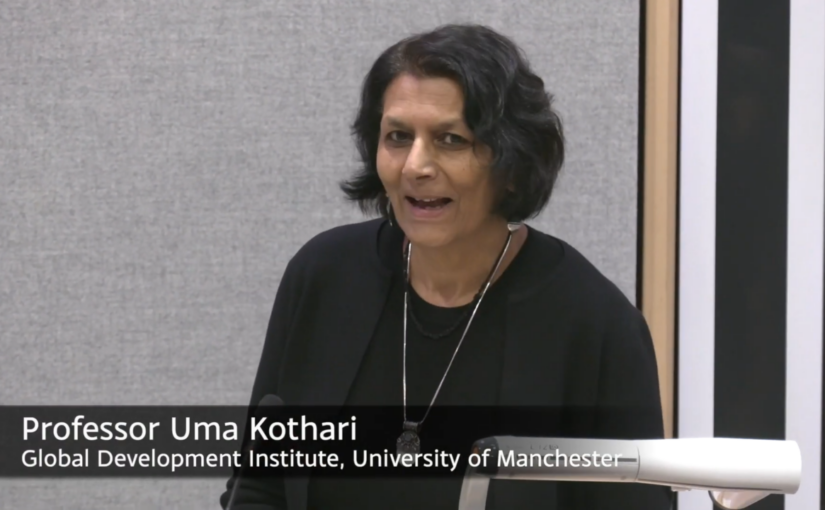Jon Ensor, IGDC Director, discusses four broad themes which came out of 2023’s Annual Lecture.
On 28 November it was my huge privilege to introduce Professor Uma Kothari as the speaker for IGDC’s 2023 Annual Lecture – Towards decoloniality and justice: when the past pushes unfinished into the present. Professor Kothari is well known for her work as a human geographer and scholar of development theory, social policy and social change.
I first came to know her work following the publication of Participation, the New Tyranny back in 2001: a groundbreaking work that challenged the co-option of participation, identifying how its roots as a radical force for redistributing power had been eroded as it entered the toolbox of approaches deployed by those more comfortable working with dominant interests.
In this lecture, co-option again appeared (more on that below) in an important reminder that radical and emancipatory concepts – including participation, and decoloniality – will never be enough to secure transformative change. Rather, we must focus on and constantly interrogate our praxis, critically examining from where it springs and for whom the benefits accrue.
Engaging, informative and punctuated with stunning images, this year’s annual lecture left me thinking about four broad themes. The caricatures that follow are inspired and informed by Professor Kothari’s thesis – but don’t claim to be an accurate report of her talk, or a reflection of the nuance and depth of her scholarship!
You can find the full talk on the IGDC YouTube channel.
Future perfect
Professor Kothari opened with a discussion of how development discourse fetishises the future; obsessing over future goals while ignoring the relevance of the past. Recurrent efforts to rethink development are imbued with this orientation (think: SDGs), looking to prescribe the future through goals and targets. Inevitably, these targets are not fully open and do not leave communities and peoples “free to become”. Amnesia underpins and enables development, allowing it to ignore its own colonial history and to become a system that is seeking to solve the problems that it has caused. At the same time, amnesia and the future-perfect mindset close down the space to break this cycle and inhibit our ability to explore escape pathways and transformation.
Missing histories
Amnesia, and the limited historical analysis that it implies, is a central obstacle to decoloniality, concealing the past and leaving present day legacies unexplored. Distancing ourselves from the past – implicitly conceiving of history as irrelevant to development – allows “the endless circulation of abbreviated histories and bad ideas”. No room is made in our conceptual frameworks or methodological approaches to recognise past injustices, explore their genesis and consequences, or consider how remedies might be developed and secured. This ahistorical mire allows uneven geographies of time to emerge, in which those “over there” can be understood as less developed, more traditional, not modern and / or more primitive; dualisms that persist even when obscured by language that delicately differentiates between the global north and south.
Co-option capture
As noted above, a central problem for development is the persistent spectre of co-option. If decolonisation is to have real meaning and real teeth, then it needs to avoid being sanitised and depoliticised in the way of so many similar terms and concepts. How long until the neoliberal co-option of development solidarity – shopping our way out of crisis – is reworked to identify decolonial consumption or a new line in reparation offsets? This potential for capture is perhaps all the more pointed because decolonisation is in part about not doing: it demands that development scholars, professionals and privileged polities at times step aside and let others speak and set the agenda in processes of social, economic and cultural change.
Where next?
Identifying and acknowledging the continuing legacy of coloniality and challenging the “lure of amnesia” means that development needs a new role, and new narratives, that not only recognise the echoes of colonialism that surround us – in art and architecture, for example – but also foreground neglected stories and release submerged and suppressed ways of understanding the world. This means recognising the cultural context of knowledge but – and it’s an important “but” – there’s also a trap here for efforts towards decolonising development. The strongest message I took from Professor Kothari’s lecture was the risk of worrying about decolonising knowledge at the expense of dismantling the structures, institutions and praxis that is the legacy of colonialism. We need to focus on material transformation rather than only on symbolic shifts. The return of territory, the repatriation of stolen resources, and the transformation of structures cannot be lost in an explosion of anti-racist and social justice metaphors that allow evasions and continued reproduction of colonial relations.
For IGDC, this annual lecture was an important opportunity to reflect on our commitment to decoloniality, to be challenged on what it means for our approach to research, and to problematise the assumptions and perspectives that we bring to global development. Professor Kothari’s talk surfaced critical issues: how we work with history and think about social justice; how we balance concern with the future with appreciation for how we arrived at where we find ourselves today; and perhaps most pointedly, how so much of our work – across disciplines – has learnt to ignore legacies of empire, race science, dispossession and exploitation. It is for us to take these concerns seriously, and ask what they mean for our work and how we understand ‘global development’ as an area of engaged research and practice.

